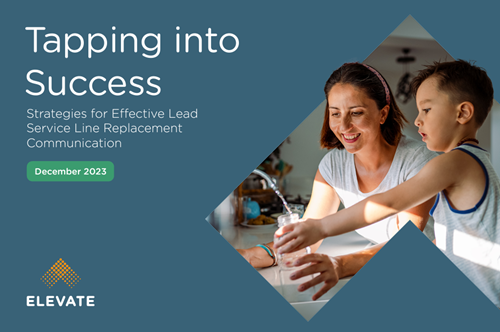Lead is a common toxic metal that can enter your drinking water through pipes and plumbing materials made of lead. Elevate works to identify lead in water and mitigate sources of lead when found.
While lead exposure has health implications for all people, the effects are especially concerning among infants and children under age six. Many of our services are targeted to child care providers to take appropriate action and protect the children in these homes.
Lead in Water Research
 Tapping into Success: Strategies for Effective Lead Service Line Replacement Communications
Tapping into Success: Strategies for Effective Lead Service Line Replacement Communications
As far back as the 1940s, the water sector recognized the need for better communications. This report focuses on lead service line replacement (LSLR) program communication, education, and outreach. Elevate spoke with staff, elected officials, and consultants for municipalities nationwide where LSLR programs are underway to learn about what has worked well and what hasn’t. We also talked to residents and other stakeholders about their experiences on the receiving end of those communications.
Wherever your municipality is in the process, this report is designed to share lessons learned and key considerations for successful LSLR program communications – to help us all remove lead service lines (LSLs) as safely and efficiently as possible while keeping communities engaged.
Lead in Water Testing
Testing your water is the only sure way to determine whether lead is present.
Elevate administers LeadCare Illinois, a statewide program that provides child care providers with training about the dangers of lead, how to conduct lead testing, and what to do if lead is present in their facility’s drinking water. After completing training, child care providers receive a free lead in water test kit. If lead is present, we provide child care facilities with education on mitigation strategies that will help minimize or eliminate the lead in their water.
Elevate administers LeadCare Illinois in partnership with the Illinois Department of Public Health, Illinois Environmental Protection Agency, and Illinois Action for Children. Funding is provided in whole or in part by the Illinois Department of Public Health.
Plumbing Upgrades to Address Lead
Common sources of lead in water include lead pipes, faucets, and fixtures, as well as galvanized pipes, brass or chrome-plated fixtures containing lead, and lead solder connecting copper piping. A plumbing assessment can identify sources of lead and point to strategies for mitigation.
Elevate administers LeadCare Complete, which offers Chicago child care providers free plumbing upgrades to address lead in drinking water. The program completely covers the costs to conduct a plumbing assessment and replace internal plumbing containing lead, such as faucets and water fountains. We also install filters to reduce lead in your drinking water if needed.
LeadCare Complete is made possible through a U.S. Environmental Protection Agency grant and support from the City of Chicago.
Lead Service Line Replacements
A water service line is the pipe that delivers water to your home from the water main in the street. If it’s made of lead or galvanized material, the service line can unpredictably release toxic lead particles into the water as it travels to your home. Illinois has approximately 700,000 known lead service lines, one of the highest quantities in the country.
Learn how to determine if your home is connected to a lead service line in our blog, “Lead Service Lines 101“.
Elevate administers LeadCare Cook County, which offers free removal and replacement of lead and galvanized service lines connected to home-based child care facilities in suburban Cook County. In 2023, LeadCare Cook County is available on a first-come, first-served basis in Calumet City, Cicero, Harvey, Hazel Crest, and Maywood.




